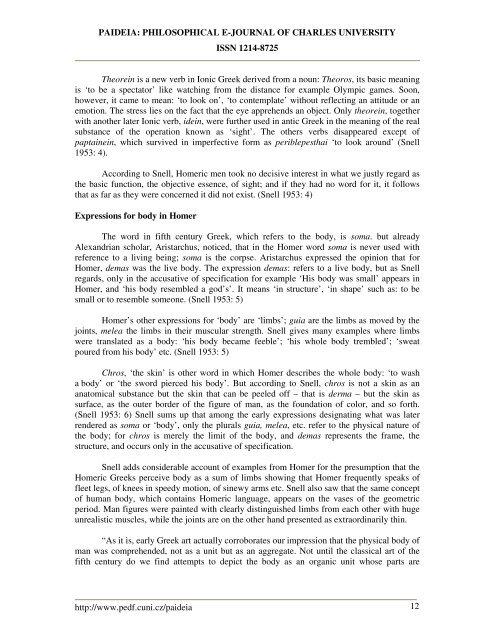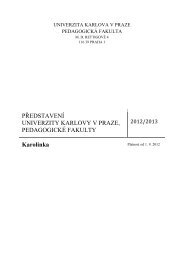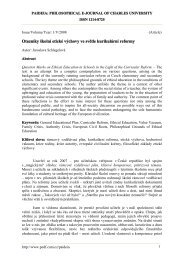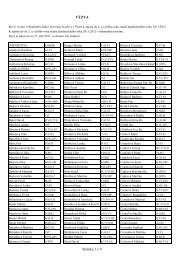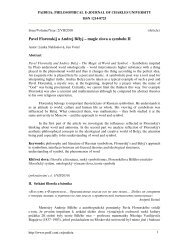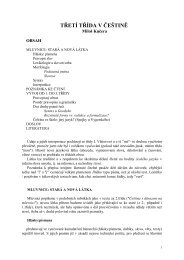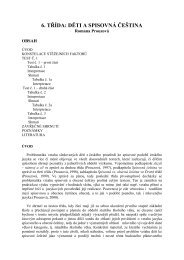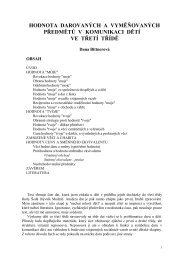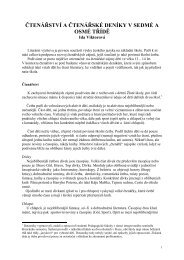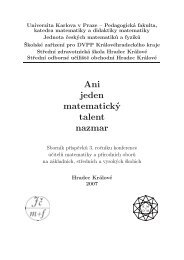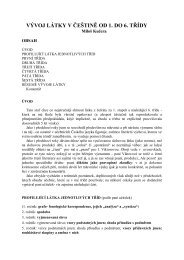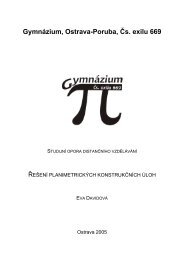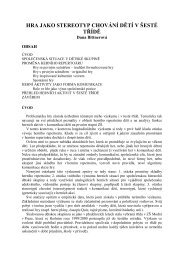Feyerabend's interpretation of Archaic Age
Feyerabend's interpretation of Archaic Age
Feyerabend's interpretation of Archaic Age
Create successful ePaper yourself
Turn your PDF publications into a flip-book with our unique Google optimized e-Paper software.
PAIDEIA: PHILOSOPHICAL E-JOURNAL OF CHARLES UNIVERSITYISSN 1214-8725Theorein is a new verb in Ionic Greek derived from a noun: Theoros, its basic meaningis ‘to be a spectator’ like watching from the distance for example Olympic games. Soon,however, it came to mean: ‘to look on’, ‘to contemplate’ without reflecting an attitude or anemotion. The stress lies on the fact that the eye apprehends an object. Only theorein, togetherwith another later Ionic verb, idein, were further used in antic Greek in the meaning <strong>of</strong> the realsubstance <strong>of</strong> the operation known as ‘sight’. The others verbs disappeared except <strong>of</strong>paptainein, which survived in imperfective form as periblepesthai ‘to look around’ (Snell1953: 4).According to Snell, Homeric men took no decisive interest in what we justly regard asthe basic function, the objective essence, <strong>of</strong> sight; and if they had no word for it, it followsthat as far as they were concerned it did not exist. (Snell 1953: 4)Expressions for body in HomerThe word in fifth century Greek, which refers to the body, is soma. but alreadyAlexandrian scholar, Aristarchus, noticed, that in the Homer word soma is never used withreference to a living being; soma is the corpse. Aristarchus expressed the opinion that forHomer, demas was the live body. The expression demas: refers to a live body, but as Snellregards, only in the accusative <strong>of</strong> specification for example ‘His body was small’ appears inHomer, and ‘his body resembled a god’s’. It means ‘in structure’, ‘in shape’ such as: to besmall or to resemble someone. (Snell 1953: 5)Homer’s other expressions for ‘body’ are ‘limbs’; guia are the limbs as moved by thejoints, melea the limbs in their muscular strength. Snell gives many examples where limbswere translated as a body: ‘his body became feeble’; ‘his whole body trembled’; ‘sweatpoured from his body’ etc. (Snell 1953: 5)Chros, ‘the skin’ is other word in which Homer describes the whole body: ‘to washa body’ or ‘the sword pierced his body’. But according to Snell, chros is not a skin as ananatomical substance but the skin that can be peeled <strong>of</strong>f – that is derma – but the skin assurface, as the outer border <strong>of</strong> the figure <strong>of</strong> man, as the foundation <strong>of</strong> color, and so forth.(Snell 1953: 6) Snell sums up that among the early expressions designating what was laterrendered as soma or ‘body’, only the plurals guia, melea, etc. refer to the physical nature <strong>of</strong>the body; for chros is merely the limit <strong>of</strong> the body, and demas represents the frame, thestructure, and occurs only in the accusative <strong>of</strong> specification.Snell adds considerable account <strong>of</strong> examples from Homer for the presumption that theHomeric Greeks perceive body as a sum <strong>of</strong> limbs showing that Homer frequently speaks <strong>of</strong>fleet legs, <strong>of</strong> knees in speedy motion, <strong>of</strong> sinewy arms etc. Snell also saw that the same concept<strong>of</strong> human body, which contains Homeric language, appears on the vases <strong>of</strong> the geometricperiod. Man figures were painted with clearly distinguished limbs from each other with hugeunrealistic muscles, while the joints are on the other hand presented as extraordinarily thin.“As it is, early Greek art actually corroborates our impression that the physical body <strong>of</strong>man was comprehended, not as a unit but as an aggregate. Not until the classical art <strong>of</strong> thefifth century do we find attempts to depict the body as an organic unit whose parts arehttp://www.pedf.cuni.cz/paideia 12


